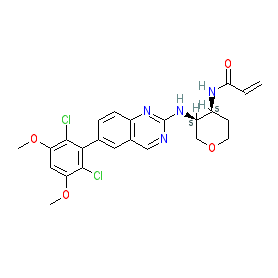GtoPdb is requesting financial support from commercial users. Please see our sustainability page for more information.
|
Synonyms: BLU-554 | BLU554 | CS-3008 | CS3008
Compound class:
Synthetic organic
Comment: Fisogatinib (BLU-554) is an orally bioavailable, potent and highly selective fibroblast growth factor receptor 4 (FGFR4) inhibitor. It was discovered by Blueprint Medicines [1] (probably compound number 40 therein), and is being investigated for clinical anti-tumour efficacy in cancers that are driven by FGFR4 activation (for example, in liver cancers where the FGF19/FGFR4 signalling pathway is activated by genetic alteration). Structurally, fisogatinib is a derivative of BLU-9931 and is similarly an irreversible type tryosine kinase inhibitor.
Ligand Activity Visualisation ChartsThese are box plot that provide a unique visualisation, summarising all the activity data for a ligand taken from ChEMBL and GtoPdb across multiple targets and species. Click on a plot to see the median, interquartile range, low and high data points. A value of zero indicates that no data are available. A separate chart is created for each target, and where possible the algorithm tries to merge ChEMBL and GtoPdb targets by matching them on name and UniProt accession, for each available species. However, please note that inconsistency in naming of targets may lead to data for the same target being reported across multiple charts. ✖ |
|
|||||||||||||||||||||||||||||||||||
| No information available. |
Summary of Clinical Use  |
| ClinicalTrials.gov has one registered BLU-554 trial (as of Feb 2019) that is a first-in-human study designed to ascertain the safety, tolerability, pharmacokinetics (PK), pharmacodynamics (PD), and preliminary antineoplastic activity of BLU- 554 as an orally delivered drug in patients with advanced FGF19-positive hepatocellular carcinoma. Click here to link to ClinicalTrials.gov's full list of BLU-554 trials. In China clinical development has been licenced to CStone Pharmaceuticals, and their research code for the compound is CS3008. Preliminary clinical data is reported, in a review of therapies that are in development for gastrointestinal cancers, by Yee (2018) [2]. This early data shows that BLU-554 produced an anti-tumour response in patients with FGF19-positive HCC (, but not in patients with FGF19-negative HCC, a result that validates the mechanism of action of BLU-554. We await peer-reviewed publication of this data. |






